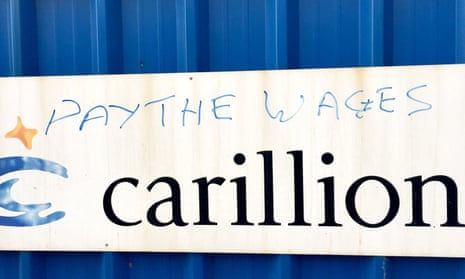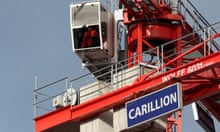Carillion’s former finance director considered putting cash into the firm’s pension deficit a “waste of money”, according to the minutes of a meeting written by the pension scheme trustees.
The meeting was raised as MPs voiced concerns about Carillion’s attitude to pensions during a parliamentary evidence session in which the Pensions Regulator and accountancy firm KPMG, which audited the firm’s accounts, faced stinging criticism. The regulator said it was investigating whether it could force Carillion bosses to hand back millions of pounds in bonuses to compensate nearly 30,000 pensioners, whose payouts are likely to be cut by up to 15% due to the company’s failure. But it came under fire for a perceived lack of action to force Carillion to pay enough money into the schemes.
Quick GuideAll you need to know about Carillion
Show

What was Carillion?
The Wolverhampton-based firm was second only to Balfour Beatty in size.
It was spun out of the Tarmac construction business in 1999 and steadily took over rivals, such as Mowlem and Alfred McAlpine. It expanded into Canada and built a construction arm in the Middle East.
Carillion then diversified into outsourcing, taking on contracts such as running the mailroom at the Nationwide building society to helping upgrade UK broadband for BT Openreach. It took over running public service projects, ranging from prison and hospital maintenance to cooking school meals. In 2017 a third of its revenue – £1.7bn – came from state contracts. It employed 43,000 people, with more than 19,000 in the UK.
Notable construction projects
• GCHQ government communications centre in Cheltenham (2003)
• Beetham Tower, Manchester (2006)
• HS1 (2007)
• London Olympics Media Centre - now BT Sport HQ (2011)
• Heathrow terminal 5 (2011)
• The Library of Birmingham (2013)
• Liverpool FC Anfield stadium expansion (2016)
Government contracts
• NHS – managed 200 operating theatres; 11,800 beds; made 18,500 patient meals a day
• Transport – “smart motorways” to monitor traffic and ease congestion; work on HS2; track renewal for Network Rail; Crossrail contractor
• Defence – maintained 50,000 armed forces’ houses; a £680m contract to provide 130 new buildings in Aldershot and Salisbury plain for troops returning from Germany
• Education – cleaning and meals for 875 schools
• Prisons – maintained 50% of UK prisons.
As MPs questioned officials from the regulator, the work and pensions committee chair, Frank Field, referred to a meeting between trustees and the regulator in 2013, the minutes of which indicate that trustees thought the finance director at the time, Richard Adam, considered pension payments a “waste of money”.
Three witnesses from the regulator said they had not been at the meeting.
The regulator’s director of case management, Mike Birch, said it later threatened to impose increased contributions on Carillion, prompting an increase in payments of £85m spread over 15 years.
Documents released by MPs earlier in the inquiry showed trustees believed that far more, an extra £30m a year, was necessary to fund the scheme, which has a deficit estimated at nearly £1bn.
Field said directors instead chose to pay “mega dividends” and were boasting to the City about doing so.
He said: “They were shovelling money out to themselves, they were shovelling it to shareholders, why didn’t you get them to shovel it to pensioners?”
Q&AWhat is a pensions deficit?
Show
A deficit occurs when a salary-related pension scheme doesn't have enough assets to pay for all its future possible liabilities - ie, payouts to workers when they retire.
How is it measured?
There are different ways of measuring a deficit, which can result in widely different figures. However, it is a legal requirement to reduce any deficit over time. This requirement has changed a number of times in recent years as the government has tried to get the right balance between protecting members' future pensions and not putting so heavy a funding obligation on employers as to encourage them to close schemes, according to workSMART, a website run by the TUC.
Things that affect a scheme’s funding position include contribution levels, investment returns (both those being achieved now and what experts forecast for the future), interest rates, inflation and life expectancy data.
What can be done to top up pension schemes?
Either the employer makes additional payments to narrow the deficit, or the trustees find other ways of reducing it, such as cutting benefits, upping member contributions or even shutting down the scheme so that workers can't carry on paying into it.
The regulator’s chief executive, Lesley Titcomb, who faced ridicule for failing to remember key figures, said the organisation should in hindsight have done more to extract higher pension contributions from Carillion.
Titcomb, who took the job in 2015 after the period in question, said: “We would not have continued so long in that negotiation situation,” she said. “We need to be clearer, quicker and tougher. We will change further.”
KPMG also came under fire for signing off the 2016 accounts just a few months before Carillion announced £845m of writedowns and issued a profit warning.
The Labour MP Peter Kyle said: “I wouldn’t trust you to audit what’s in my fridge.”
The business committee chair, Rachel Reeves MP, referred to the Guardian’s interview this week with a former Carillion executive, who said financial problems were apparent in mid-2016.
She said: “Investors seemed to know, people who worked for the company seemed to know, the only people who didn’t see what was happening were those who were paid to: the directors and the auditors of the company.”
Speaking after the evidence session, Field said auditors and regulators were “mere spectators – commentators at best, certainly not referees – at the mercy of reckless and self-interested directors”.
Reeves said the auditor’s work appeared to be a “colossal waste of time and money, fit only to provide false assurance to investors, workers and the public”.
Peter Meehan, a KPMG partner, said his team had done “the best we could”, insisting most of Carillion’s problems emerged after he signed off the company’s 2016 accounts in March last year.
He also cast doubt on a claim by Carillion’s former chief executive Richard Howson that Qatari firm Msheireb Properties had owed the company £200m, a claim the Gulf property firm also denies.
Meehan added that KPMG, which received more than £29m in fees from Carillion over a decade, warned directors they were at the “more optimistic” range when assessing the value of their contracts.
Separately, Unite raised concerns about “missing” pension payments it said had been deducted from members’ pay packets before Carillion’s collapse but had not reached the retirement scheme.
“We need to know what has happened to these payments, possibly involving more than £1m,” said the trade union’s national officer for health, Colenzo Jarrett-Thorpe.
“At present, they appear to have mysteriously disappeared into the financial abyss.”









